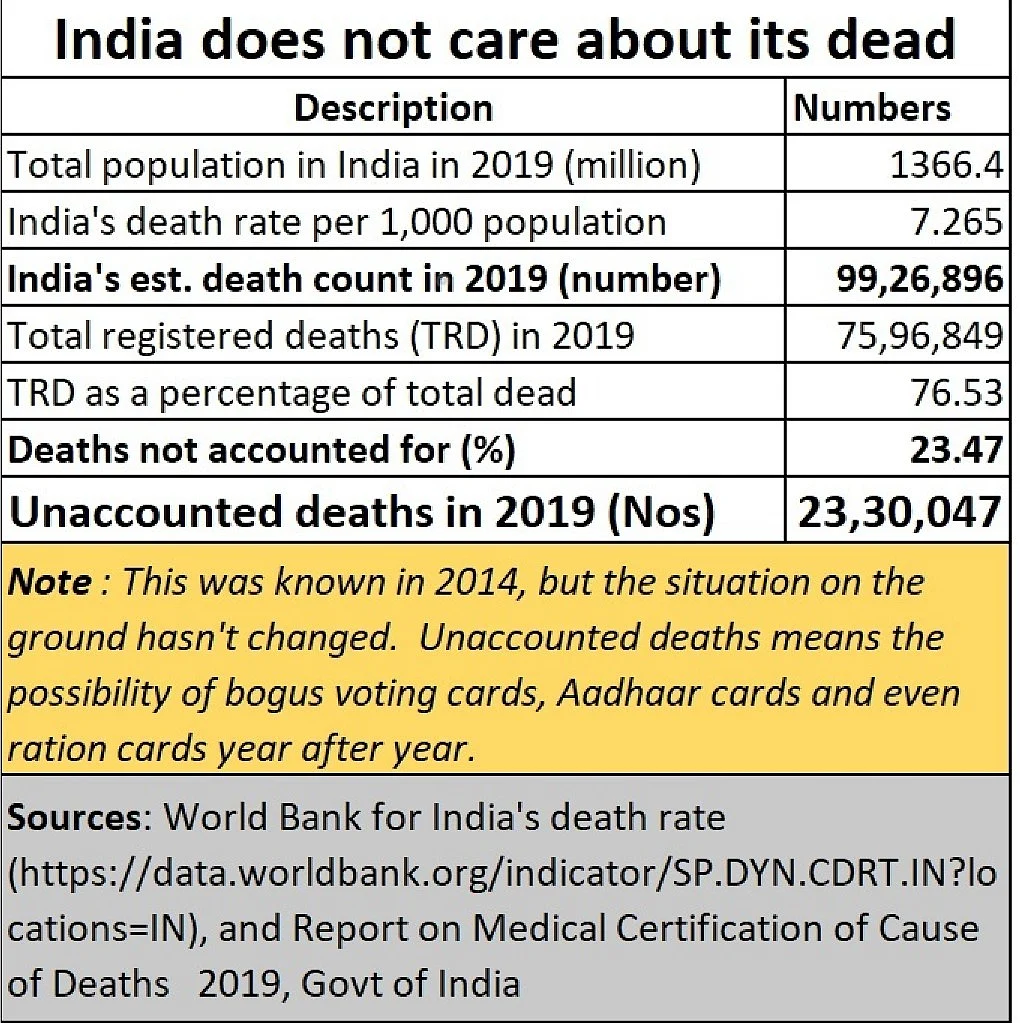When beggars die, there are no comets seen;
The heavens themselves blaze forth the death of princes.
William Shakespeare, Julius Caesar
The brutal reality of Shakespeare’s words become more painful when one considers how India treats its dead. And as the old saying goes, you cannot expect a government to respect the living, if it hasn’t learnt how to respect the dead.
This article is thus the first in a three-part series that examines this horror confronting the civilised world. The second part of the article is about how and why states fudge numbers. The masters at this game are (no prizes for guessing right) Bihar, Jharkhand, UP, Uttarakhand and MP. And slums, of course. The third part of this series deals with what can be done to remedy the situation. The role of the Election Commission (EC) is crucially important. Medical seats need to be increased. And the supervision of the Supreme Court is urgently required for the safety of both democracy and the Indian Constitution.
Brutal facts
Ques of corpses lined up before crematoriums. Bodies floating down the river. Corpses emerging from sandbanks where they had been clandestinely buried. Pictures to make you squirm. The government comes up with lame excuses.
But concealing facts about the dead isn’t something new. The government has been doing this for over 10 years. Many dead are not even regist3ered as dead. That is good for politics, and often good for financial gain as well.
Check out the table alongside. During 2019, even before the pandemic hit India, at least 23 lakh people in India died without their deaths being registered. This number is not given in the government’s reports but is derived from the death rate figure given out by the World Bank, and then deducting the total number of registered deaths from it. More in the next article.
In fact, way back, on August 28, 2014, an officer named RK Gautam, Deputy Registrar General, Office of the Registrar General of India, Ministry of Home Affairs, Government of India, formally raised this. He wrote that “the data on cause-specific mortality generated under the scheme suffers on account of reliability, representativeness and comparability…”
His figures are a bit understated because he too was possibly missed. The fact is that year after year, almost 20 per cent of the estimated deaths have been routinely forgotten. These dead might have been murdered, hounded out to die in the wilderness, massacred during the pogroms successive governments have engineered to polarise societies to win elections. Or they could have been destitutes whom the government was glad to be rid of. When a death is not registered, nobody knows about it.
During 2019, over 23 lakh persons went missing.

Profiting from death
But their ration cards probably survived, as did their pension papers. There was nobody to tell the government that they had died. And it is quite possible that their Aadhaar cards are alive as well, adding to the huge number of bogus Aadhaar cards plaguing this country. No matter what the government may say, there is enough documentation on record to confirm that more Aadhaar cards were given out than even the populations in some states.
And the surprising thing is that the EC has maintained a studied silence on this. It did not question the existence of bogus Aadhaar cards, based on which election cards are issued. It did not ask questions on the basic flaw in the Aadhaar cards – that they authenticated the holder, but did not identify him or her. And it has not made suggestions on how this situation should be rectified.
Worse, it has not asked questions about the Aadhaar cards of the dead that are floating around even now. Ditto with election cards. In other words, it has permitted stuffing the ballot boxes with bogus votes, even before the election process has begun.
This is serious because 20 lakh people dying – year after year – without any records implies that their Aadhaar cards are still active, because nobody has cancelled them. Multiply this for the past five years, and you get a crore of Aadhaar and election cards which can cast bogus votes, draw on entitlements from the exchequer illegally. If unchecked, they can butcher both democracy and even the Indian Constitution.
When lawmakers ignore the bending of rules, and constitutional authorities look the other way, there is big trouble ahead.










